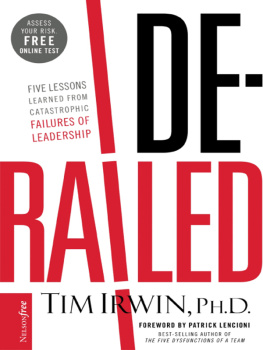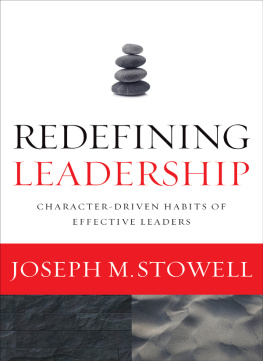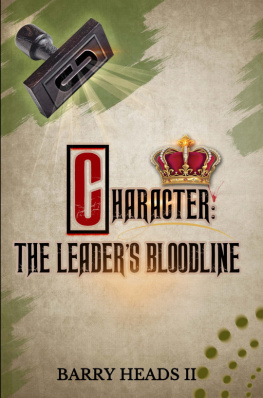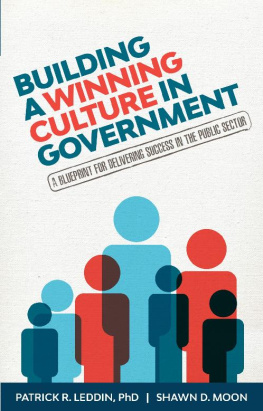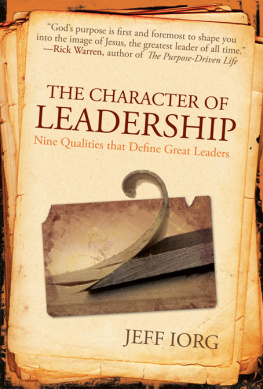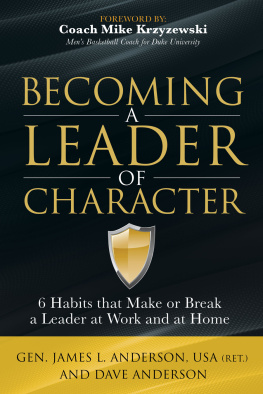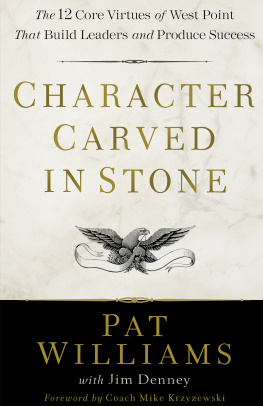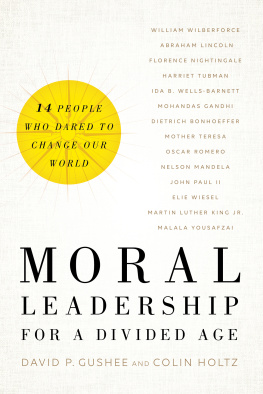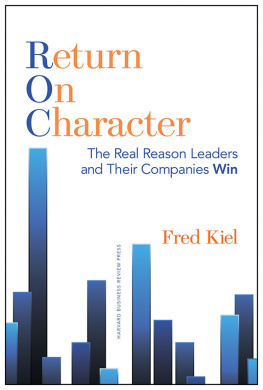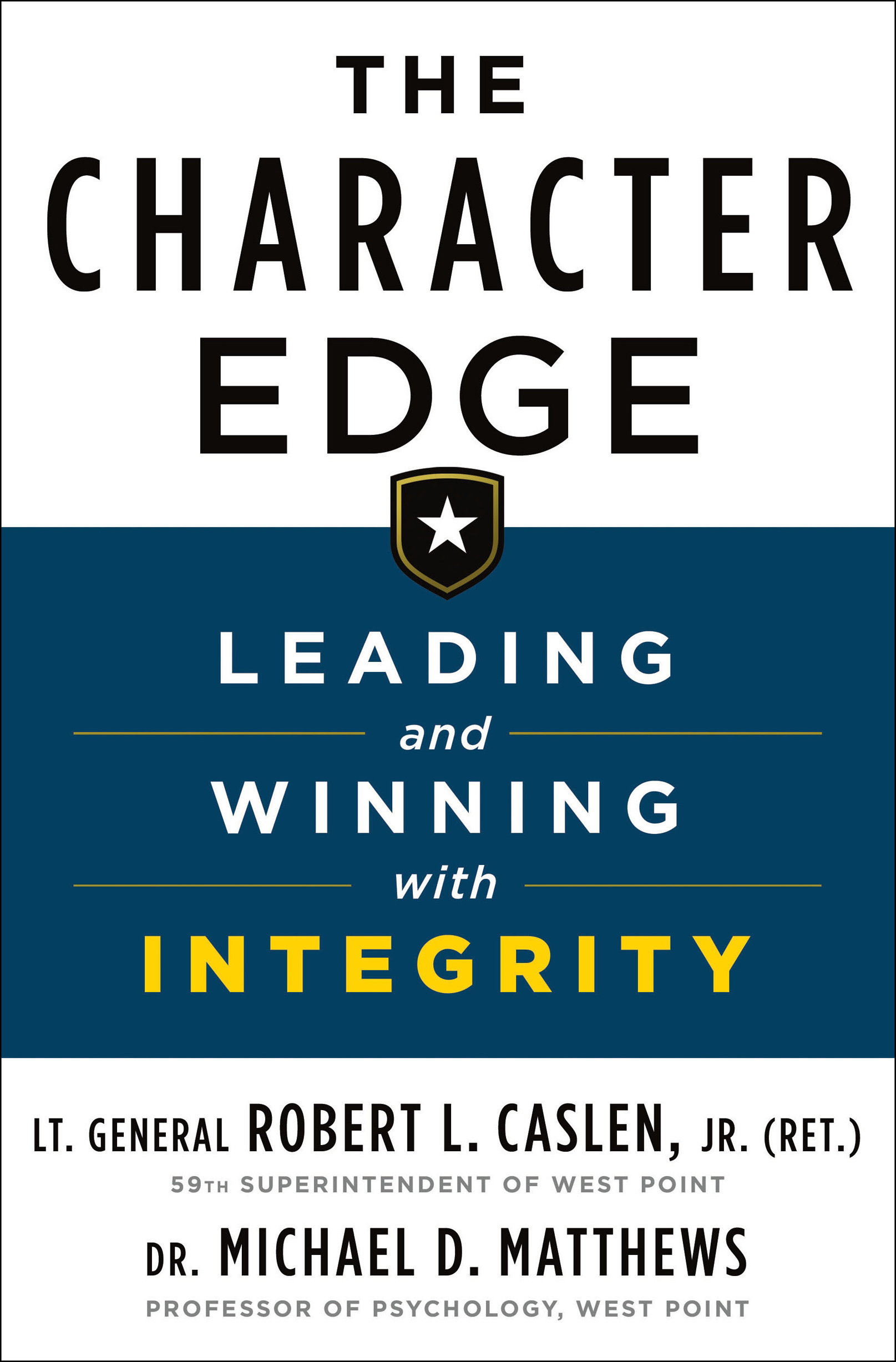The author and publisher have provided this e-book to you for your personal use only. You may not make this e-book publicly available in any way. Copyright infringement is against the law. If you believe the copy of this e-book you are reading infringes on the authors copyright, please notify the publisher at: us.macmillanusa.com/piracy.
We are deeply grateful for the numerous men and women who live lives of character and who allowed us to tell their story. May their character be a shining light that will help guide our readers through their own challenges and triumphs.
Our ideas for this book evolved from many decades of experience and study of character and leadership. Many of the leaders and scientists discussed in The Character Edge shaped our view that positive character is a fundamental requirement for individuals, leaders, and organizations to flourish and prosper, to wit, to win in the right way. Moreover, we enjoyed the benefit of working for values-based, high-performing organizations. We learned important lessons from our own leaders who were competent, of high character, and caring. Owing to our combined eighty-plus years of experience, we cannot begin to recognize each individual who contributed to our views. But for all who influenced us, you will see your mark in the pages of this book.
We thank our agent, Gillian MacKenzie, and her team for believing in us and helping us develop the proposal that grew into The Character Edge. Gillian helped transform our raw ideas into a coherent plan. We appreciate how she shares our vision of the importance of character to individuals and organizations, and her enthusiasm in turning an idea into a viable proposal, and a proposal into a book. She was with us at every stage of the project, from inception to completion. Gillians mentoring made this book better in all respects, and for that we are grateful. Thank you as well to Larry James, for introducing us to Gillian.
Our publisher, St. Martins Press, was terrific. Marc Resnick and Hannah OGrady understood our vision for the book and empowered us to tell our story in our own way. Their feedback on drafts of the book was timely and immensely helpful. Because of their competence, character, and caring, we trusted them implicitly to transform our proposal into a finished product. Everyone we worked with at St. Martins Press, from copy editors to the marketing team, were true professionals. It takes a village to raise a child, and it takes a top-drawer publishing house to raise a book. We cannot thank Marc, Hannah, and their team enough for their support and guidance.
We thank Martin Seligman for his support and for providing the foreword for The Character Edge. Also, we are indebted to the many people who reviewed the book and provided blurbs. Among these, we single out Angela Duckworth because of her fifteen-year collaborative relationship with West Point. Angela conducted one of her first studies on grit at West Point in 2004 and has since then spoken to thousands of cadets and faculty about grit and other character strengths linked to leadership.
Tufts University professor Richard Lerner has helped us to better understand character development within an institution. The principal investigator of a five-year longitudinal study of character development at West Point, Project Arete, Rich has researched positive youth development for thirty years, and his work has guided our efforts to better understand character and how to develop it among cadets. We are grateful for Richs unwavering support of West Points efforts to fully integrate character into its officer-development model.
This brings us to our project manager, Gretchen Bain Matthews. First a bit about Gretchens background. The careful reader will see she shares her last name with one of the authors. This is not a coincidence; she is the second authors spouse. Gretchen is an experienced and talented writer and editor, who assists scientists in preparing top-quality manuscripts ranging from dissertations to top-tier-journal submissions. Gretchen has worked in technical writing and editing since graduating with a bachelors degree in English from Pomona College. As well honed as her writing and editing skills are, her organizational skills are what set her apart. The reader only sees the tip of the icebergthe bookbut below the surface lurks the real work that goes into publishing a book. Keeping track of drafts, editing for style and content, corresponding with stakeholders, and making sure everything is completed on time are just as important as the writing. Without Gretchens amazing organizational acumen, this book would never have been completed.
ROBERT L. CASLEN, JR., and DR. MICHAEL D. MATTHEWS
I also thank my wife, Shelly, and my sons Robert III, Nicholas, and Jeffrey, and their families, who have put up with a husband and father struggling to balance his life while trying to achieve excellence in husband-hood and fatherhood, and within his chosen profession as well. God has blessed us with family, health, unconditional love, and challenges to our character every day. I am so fortunate to have a wife and children who love me unconditionally and who lift me up every day.
ROBERT L. CASLEN, JR.
This book catapults General Robert Caslen and Professor Michael Matthews into the front rank of the legion of people now working on good character across the world.
Part of the reason for the success of this book is the character and hugely different experiences of the two people who wrote this gem. I want tell you about each of them.
I first met General Caslen when he was the brigadier general who had just taken his new assignment as commandant of West Point. I was a visitor lecturing to the cadets about resilience and post-traumatic growth. We met to discuss the future of his counseling service. General Caslen was concerned that the counseling service was exclusively occupied with bad stuff: drug abuse, low-level criminality, and sexual harassment.
Couldnt counseling do better than just this, by giving advice and measuring the good stuff as well, he asked, like how to become an exemplary soldier or how to make academic choices based on ones strengths, not just how to be less bad? I could see that we were on the same wavelength. His interest was military excellence and academic excellence and so was mine. My specific interest there was in transforming counseling services in psychology generally into being about what makes life worth living as opposed to just about how to deal with the negative stuff and with the bad apples. So he and I talked about the possibility that the counseling center could be a place where cadets find out about the best things about themselves. I left the meeting thinking, This guy is a visionary.
Fast-forward a few years later: General Caslen has now become the superintendent of West Point, the officer in charge of the whole shebang. As you will read, the theme of his tenure was the building of character. His many years of experience in the field at every level of command had taught him that building character is the cornerstone of military leadership. And this is what he brings to this book: thousands of hours of actual leadership ranging from in extremis on the battlefield to the more pastoral setting of West Point.
His partner in this book is Professor Michael Matthews, a scholar, researcher, and teacher of long experience. I first met Mike more than fifteen years ago when I was organizing the future of positive psychology. We invited Mike to become a senior fellow for several months at the University of Pennsylvania under a grant from the John Templeton Foundation and Atlantic Philanthropies. Angela Duckworth and I had just begun to work on grit, and Mike and Angela began a collaboration with West Point to study who quits the academy after Beast Barracks, the grueling summer program that new cadets face as their first introduction to the Army. Grit proved to be a significant predictor of not quitting, and this expanded into Mikes work on character as a predictor of military success and also launched Angelas remarkable career. So what Mike brings to this book are serious behavioral science, rigor, and many years of experience teaching and measuring the minds and behavior of cadets.


